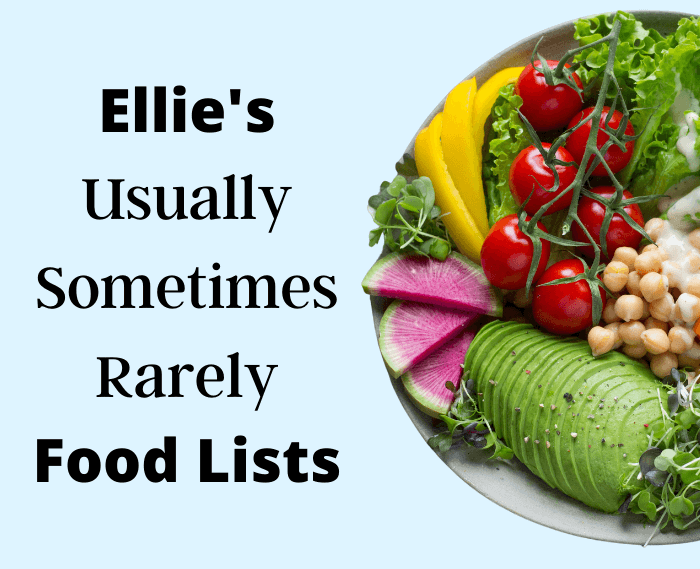No single food eaten occasionally will ruin an overall good diet, so instead of thinking of foods in absolute terms–good/bad, clean/sinful, healthy/unhealthy– try taking a wider-angle view of your eating pattern. These food lists can be helpful to guide you in the choices you make. Since it is what you eat usually that really counts, I find it helpful to think of foods as Usually, Sometimes, and Rarely. Notice there is no Never category. There is no need to deprive yourself of any food or feel guilty about eating. Just try to stick to the Usually foods as much as possible —allowing yourself the flexibility to incorporate Sometimes and Rarely foods here and there.
I created these food lists way back when I was in private practice, and published it in my first book Small Changes, Big Results. It has guided me both in my personal eating habits and in the way I develop recipes ever since. It’s not perfect, because the truth is food is complex doesn’t neatly fit into three categories. But while imperfect, food lists can be a useful way to look at things and get you out of all-or- nothing food mentality. I hope you find these Usually, Sometimes, and Rarely food lists helpful!
USUALLY
These foods are the most nutrient-rich, minimally processed, and healthful and should be the backbone of your daily diet. Aim to get most of your daily servings from this group.
Vegetables
- Any vegetable: fresh, frozen (not in sauce), low-sodium canned, fermented
- Herbs, spices (fresh or dried)
Fruits
- Fruit: fresh, frozen (unsweetened) or canned in natural juice (not sweetened syrup)
Whole Grains & Starchy Vegetables
- Cooked whole grains: oats, brown rice, bulgur, quinoa, buckwheat, farro, etc…
- Whole grain bread, whole grain rolls, whole wheat bagels
- Whole grain, low-sugar cold breakfast cereals such as Shredded Wheat, Bran Flakes, Cheerios
- Whole grain, low sugar hot cereals
- Whole grain, low-fat crackers,
- Whole grain pasta, whole wheat cous-cous
- Whole wheat or corn tortillas
- Popcorn (lightly salted/seasoned)
- Potatoes, sweet potatoes
- Corn
Seafood, Meat, Poultry & Eggs
- Seafood: any fish or shellfish not on the Rarely list
- Poultry: fresh chicken, turkey, any cut
- Pork: tenderloin, loin, lean ham
- Game meats: venison, ostrich, buffalo
- Eggs (up to 1 whole egg daily, unless you are vegetarian)
Beans, Soy, Nuts & Seeds
- Any beans, lentils, black-eyed peas, split peas, chickpeas
- Soy: tofu, tempeh, miso
- Nuts: walnuts, almonds, pistachios, hazelnuts, pecans, macadamia nuts, peanuts
- Seeds: pumpkin seeds, sunflower seeds, sesame seeds, flax seeds
- Peanut butter; almond butter, other nut butters
- Seed-based crackers
Dairy and plant milks
- Milk, yogurt, cottage cheese, buttermilk (unsweetened)
- Plant milks, light coconut milk (unsweetened)
Healthy Fats & Oils
- Olive oil
- Flaxseed oil
- Canola oil
- Peanut oil
- Grapeseed oil
- Safflower oil
- Walnut oil
- Avocado oil
SOMETIMES
These foods are somewhat more processed, contain more added sugar, and/or more saturated fat than those on the usually list, but most have positive nutritional attributes and can add valuable texture and flavor to dishes. Enjoy these with portions size in mind, aiming to have no more than 3 servings from this list per day.
Vegetables
- Vegetables with rich cream sauces or creamy dressings
- Vegetable juice
Fruits
- Full fat coconut milk
- 100% Fruit juice
Grains & Starchy Vegetables
- Refined (not whole grain) breads, rolls, and bagels
- Cold cereals that are not whole grain
- Crackers that are not whole grain
- Whole grain/less sugar baked goods such as: muffins, quick-breads, biscuits, pancakes
- White rice, regular pasta
- Granola bars
- Baked chips
Seafood, Meat, Poultry & Eggs
- Poultry: duck, poultry sausage
- Beef: lean cuts such as eye of round, top sirloin, top loin (strip) steak, lean ground beef
- top round, chuck shoulder pot roast, brisket (flat half) tenderloin, flank steak, T-bone
- Lamb: lean cuts such as sirloin, shank, shoulder
- Pork: Canadian bacon, regular ham
Dairy
- Sweetened yogurt
- Cheese
Fats
- “Vegetable” oil, Corn oil, Sesame oil
- Mayonnaise
Sweets
- Honey, maple syrup, molasses, agave
- Good quality dark chocolate
- Whole grain/less sugar/fruit-based cookies and cakes (fig bars, graham crackers, biscotti)
- Frozen yogurt, milk-based frozen desserts, fruit-based frozen desserts
RARELY
These foods are highly processed and/or have a lot of saturated fat, trans fat and refined sugar. Aim for 7 servings or fewer from this list per week, or eat them in small portions.
Vegetables
- Battered and fried vegetables
Fruits
- Fruit “drinks” or “cocktails”
- Fruit canned in syrup
Grains & Starchy Vegetables
- Packaged baked goods and crackers made with hydrogenated or partially hydrogenated vegetable oil (avoid entirely or strictly limit)
- Heavily sweetened cold cereals and bars
- Fried chips
- French fries, fried potatoes
- Regular muffins, quick-breads, pancakes etc…
Seafood, Meat and Poultry
- Seafood: king mackerel, shark, swordfish, tilefish ***see note
- Beef: higher fat cuts such as 80/20 ground beef, corned beef, short ribs, prime rib, liver
- Pork: higher fat cuts such as ribs, butt, shoulder
- Processed meats: hot dogs, bologna, salami, regular sausage, bacon
Dairy and other
- Heavy cream, whipped cream
- Sour cream
- Crème fraiche
- Cream cheese
- Coconut cream
Fats
- Butter
- Coconut oil
- Lard
- Margarine & vegetable shortening (avoid entirely unless trans-fat free)
Sweets
- Granulated/white sugar, brown sugar
- Candy: most commercial candy bars,
- Pies, Cakes, Cookies, Donuts, Pastries
- Ice cream
*** note: women who are pregnant, may become pregnant or are nursing, and small children should avoid these 4 types of fish entirely because of their high mercury levels.



